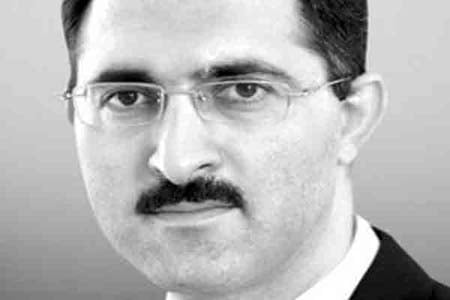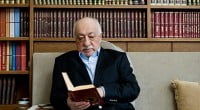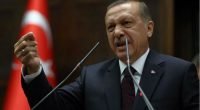Erdoğan’s plan to contain corruption scandal

Date posted: January 24, 2014
ABDULLAH BOZKURT
Perhaps Turkey’s embattled Prime Minister Recep Tayyip Erdoğan has discovered the ultimate battle plan to fight those seeking to expose corruption in government. He has reverse-engineered best practices on how best to cope with corruption and started to attack each and every one of the fundamental pillars making up that comprehensive template to curb corruption.
First, he dealt a blow to the independence and effectiveness of the judiciary by abusing the appointment and promotion mechanism controlled by his loyal man at the helm of the Justice Ministry, Bekir Bozdağ, who is also the chairman of the key judicial council, the Supreme Board of Judges and Prosecutors (HSYK). The political interference and undue influence on the judiciary through the HSYK has resulted in the reshuffling of well over 100 prosecutors and judges who were looking into important investigations of corruption, tender-rigging, influence-peddling, money-laundering and the al-Qaeda terror network. More are expected to be dismissed from their current posts soon.
The circulars ordering the transfers, usually issued over the summer when school is out, were pushed through the HSYK by the justice minister overnight in the middle of the winter season when it is harder for families to move and offered no explanation for the reassignments, in contrast to the established practice of providing a well-reasoned opinion for such dismissals and reassignments. Therefore, by muddying what ought to be transparent appointment, promotion, dismissal and disciplinary procedures, the Erdoğan government tried to hide the political objectives behind the unusual reshuffle that thwarted key investigations implicating people close to Erdoğan.
Second, Erdoğan has deliberately shaken public confidence in public institutions by blatantly disregarding the rule of law in violation of constitutional articles and contrary to the principle of safeguarding the separation of powers. The government’s specific orders that law enforcement officials not enforce court judgments or prosecutors’ summons brought forward arbitrariness at the expense of legal certainty. When Erdoğan intervened by not sending his son Bilal to give a deposition in compliance with a prosecutor’s summons, this further bolstered a feeling of discrimination and inequality before the law in the public. The core principle of a judicial review of administrative acts was also violated in a number of draft bills that are likely to be approved in the ruling party-dominated Parliament.
Third, he is now pressuring critical media, even more so than in the past, to cease coverage of corruption and other wrongdoings in government by means of the abuse of state powers such as audits, tax fines, administrative penalties, defamation lawsuits and criminal complaints. Erdoğan’s aides are also directing pro-government media to sustain relentless smear campaigns of critics and all opponents with attacks mostly based on fabricated stories and distorted facts. Since an independent media is essential for the fight against corruption, Erdoğan is going after critical media to muzzle them in the face of damaging leaks about his government.
The fourth leg in Erdoğan’s battle plan to defeat the corruption investigations is to discredit the role of civil society, important in mobilizing masses as well as generating interest for the national and international media to continue to track and condemn corruption. He chose the most powerful civic movement in Turkey, the Hizmet movement, inspired by Islamic scholar Fethullah Gülen, despite the fact that Erdoğan had previously been supportive of the movement for years. Denouncing his own public record of praise for Hizmet from just a few years back, he has started to attack it using conspiracy theories of an obscure Matrix-style “ubiquitous parallel state,” with no evidence offered to substantiate them. He thinks that if he can create a villain out of a well-respected Muslim cleric, he can easily scare all other civic groups in Turkey off and over to his side.
The fifth element in Erdoğan’s sinister campaign to overcome the corruption scandal is to dismantle the independent judiciary’s investigative powers and therefore, its ability to tackle corruption in government. If judicial bodies are not free from improper influence, lack effective means of gathering evidence and cannot preserve the confidentiality of investigations, it becomes almost impossible to investigate those in political leadership. That was why Erdoğan changed the rules overnight to compel the police and the judiciary to notify the government of all ongoing investigations at once. The government decree was later struck down by the Council of State, but the government has not enforced that ruling.
The sixth point in Erdoğan’s plan to reduce massive corruption claims carrying lesser charges aims to disprove the economic reasoning behind the fight against the corruption that clearly distorts competition and hinders economic development. Erdoğan often says how much Turkey has developed in the last decade under his rule. To the astonishment of his interlocutors, he even repeated the same fallacy when he was asked about corruption claims by European Parliamentarians in Brussels this week. By citing past economic successes, he purports that Turkey could not have achieved these accomplishments if corruption was rampant in government. That self-defeating logic does not, however, explain how much Turkey could have progressed further if these massive corruption scandals did not waste precious resources or cost the country taxable income on bribe money. It also defies common wisdom, since when the economy grows at an unprecedented pace, there is more fertile ground for corruption, especially in a country where a full-fledged democracy with strong checks and balances does not yet exist.
The seventh element in Erdoğan’s plan is to undermine the culture of integrity in the state so that corruption will thrive without a strong reaction from the public. With the consolidation of power in his hands, Erdoğan might have deliberately created a culture of corruption where everything was directed and ordered by the prime minister himself, according to the admission made by the resigned environment and urban planning minister on a live TV broadcast. By downplaying significance of millions of dollars stashed in the home of the general manager of state lender Halkbank and vouching for two main suspects in corruption cases, Erdoğan dealt a blow to the culture of integrity in government. He described the detained Iranian Reza Zarrab, the alleged ringleader in a money laundering and graft scheme, as a man who loves charity work and called Yasin al-Qadi, designated as a terror financier by the US Treasury, a close family friend who loves Turkey. He defended his son’s activities that prosecutors claim were unlawful.
The eighth point in this plan is to limit the flow of information to the public, making the government less transparent. As more information is made publicly available, civic groups and the media can more effectively apply pressure on the government to limit its interference in investigations and the judiciary will be more encouraged to take on the political leadership. The so called “name and shame” function of media can only work if they have access to judicial investigations of law enforcement officials and prosecutors as well as during the trial phases of corruption cases. Erdoğan’s people seem to have encouraged suspects to obtain gag orders from friendly judges for the ongoing investigations of corruption scandals at the expense of the public’s right to know while simultaneously trying to intimidate critical media with a series of lawsuits accusing them of violating secrecy rules. The justice minister’s unlawful stalling tactics related to delays in forwarding the criminal complaints on resigned Cabinet ministers to Parliament also aimed to hide damaging revelations from the public.
The last component in this comprehensive plan is that Erdoğan will avoid listing his total income and assets, as well as those of his spouse and children, despite pleas from the opposition parties to lay bare of all his family wealth. His declaration dated 2011 was not considered robust and does not reveal possible conflicts of interest in his dealings. There is speculation that Erdoğan hides wealth using “straw men” who are only the owners of businesses and properties on paper. The opposition parties question Erdoğan’s official declaration both in terms of quality and comprehensiveness. Erdoğan will never respond to these calls, hoping that the issue will eventually fade from the public discussion.
Well, the critical question is whether Erdoğan’s battle plan to beat the corruption scandal will work. He may be convinced that there is actually a way out of this using this wide-ranging plan to bury the investigations. But I think he is making it worse; as the crisis in Turkey gets deeper and heavier, it is becoming very difficult for the ruling party to sustain its governance of the country. Despite the obstacles he has orchestrated for those pursuing the investigations, Erdoğan has never been able to gain enough traction to shift the debate away from corruption since Dec. 17. He must now be running on fumes. ”
Source: Todays Zaman , January 24, 2014
Tags: Democracy | Hizmet (Gulen) movement | Hizmet and politics | Turkey |
























